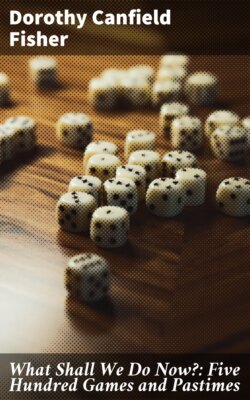Читать книгу What Shall We Do Now?: Five Hundred Games and Pastimes - Dorothy Canfield Fisher - Страница 45
На сайте Литреса книга снята с продажи.
Up Jenkins
ОглавлениеThe players sit on opposite sides of a table, or in two opposite rows of chairs with a cloth spread over their laps. A quarter or dime or other small object is then passed about among the hands of one of the sides under the table or cloth. At the word "Up Jenkins!" called by the other side all these hands tightly clenched must be at once placed in view on the table or the cloth. The first player on the other side then carefully scans the faces of his opponents to see if any one bears an expression which seems to betray his possession of the quarter, and, having made up his mind, reaches over and touches the hand in which he hopes the quarter is, saying, "Tip it." The hand is then opened. If the guess is right the guessing side take the quarter and hide it. If wrong, the same side hide it again, and the second player on the guessing side tries his luck at discovering its whereabouts. A score is decided on before the game begins, and the winning side is that which make the fewest number of wrong guesses.
Another way to play "Up Jenkins" is to have the players, equally divided, sit opposite each other at a table. A quarter is then passed along under the table by one side or team. At the command "Up Jenkins," given by the captain of the other side, chosen beforehand, all the players on the side having the coin must lift their hands above the table; and at the command "Down Jenkins," also given by the captain, all the hands must be brought down flat on the table. The greater the bang with which this is done, the less chance of detecting the sound of the metal striking the table. The captain then orders the players to raise their hands one by one, his object being to leave the coin in the last hand. If he succeeds, his side takes the coin; if he fails, the other side score the number of hands still left on the table, and again hide the coin. Another person then becomes captain. If the coin can be "spotted" in a certain hand, either by sight or sound, before a hand has been removed, it has to be forfeited, and the side that wins it adds double the number of hands of the other side to their score. If it is "spotted" and is not in that hand, the side still retains the coin, and also score double the number of hands. If anybody obeys any one else but the captain, in raising, lowering or removing his hands, his side loses the coin, no matter who holds it, but neither side scores.
